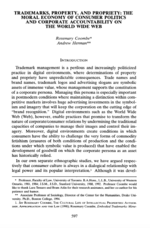“Trademarks, Property, and Propriety: The Moral Economy of Consumer Politics and Corporate Accountability on the World Wide Web”
“Trademarks, Property, and Propriety: The Moral Economy of Consumer Politics and Corporate Accountability on the World Wide Web”

“Trademarks, Property, and Propriety: The Moral Economy of Consumer Politics and Corporate Accountability on the World Wide Web” (with Andrew Herman), De Paul Law Review 50: 597-632.
Reprinted in William T. Gallagher, ed., Intellectual Property (a volume in the International Library of Essays in Law and Society, Aldershott: Ashgate Publishing, 2007) 579-608.
Abstract: Intellectual Property laws operate as moral economy, governing ownership, behavior, and norms of appropriate symbolic practice. The symbolic meaning of a commodity’s meaning, and the corporate persona in general, must be legally structured so as to constrain surplus meaning and protect against the dilution of symbolic value. Unauthorized appropriations and alternative significations must be monitored or ideally prohibited, thus shaping practices of governmentality in commercial culture. The field of governance is intensified, provoked, and challenged in digital contexts. We examine the intertwined relationship between property and propriety in cyberspace by looking at internet domain name controversies, arguing that the rise of corporate surveillance in IP protection is accompanied by digital resistance and ultimately provides opportunities for new forms of social responsibility in digital environments.
Link to article
Date Published: 2000
Publisher: De Paul Law Review
Publisher Website: https://via.library.depaul.edu/law-review/